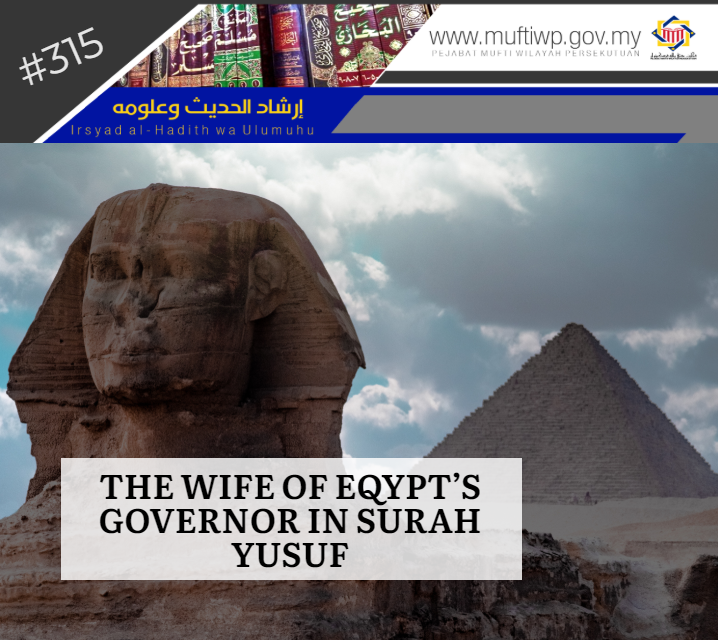Question:
Who is “امْرَأَتُ الْعَزِيزِ” (the wife of Egypt’s governor) in surah Yusuf and is it true that the Prophet Joseph (Yusuf) AS married her then?
Answer:
Alhamdulillah, praise and thanks to Allah for the countless blessings He has blessed us all with. Blessings and salutations to the Prophet Muhammad PBUH, his wives, his family, companions and all those that follow his teachings to the day of judgement.
Before we answer the above question, we would like to first present the verses of al-Quran narrating the story of Yusuf AS and the wife of Egypt’s governor who is known as “امْرَأَتُ الْعَزِيزِ” (the wife of Egypt’s governor). Among them are:
وَقَالَ الَّذِي اشْتَرَاهُ مِن مِّصْرَ لِامْرَأَتِهِ أَكْرِمِي مَثْوَاهُ عَسَىٰ أَن يَنفَعَنَا أَوْ نَتَّخِذَهُ وَلَدًا
And the one from Egypt who bought him said to his wife, "Make his residence comfortable. Perhaps he will benefit us, or we will adopt him as a son."
Surah Yusuf (21)
وَقَالَ نِسْوَةٌ فِي الْمَدِينَةِ امْرَأَتُ الْعَزِيزِ تُرَاوِدُ فَتَاهَا عَن نَّفْسِهِ ۖ قَدْ شَغَفَهَا حُبًّا
And women in the city said, "The wife of al-'Azeez is seeking to seduce her slave boy; he has impassioned her with love.
Surah Yusuf (30)
قَالَتِ امْرَأَتُ الْعَزِيزِ الْآنَ حَصْحَصَ الْحَقُّ أَنَا رَاوَدتُّهُ عَن نَّفْسِهِ وَإِنَّهُ لَمِنَ الصَّادِقِينَ
The wife of al-'Azeez said, "Now the truth has become evident. It was I who sought to seduce him, and indeed, he is of the truthful.”
Surah Yusuf (51)
Among the scholars of tafsir who stated that “امْرَأَتُ الْعَزِيزِ” is Ra’il (راعيل) is Imam al-Baghawi in his tafsir. [See: Tafsir al-Baghawi, 225/4]. Besides, Imam al-Thabari cited the opinion of Ibn Ishak in his tafsir that the phrase “امْرَأَتُ الْعَزِيزِ” is Ra’il (راعيل). [See: Tafsir al-Thabari, 15/18] and Imam al-Qurtubi also cited the same. [See: Tafsir al-Qurthubi, 158/9]. While Imam al-Baidhawi also stated in his tafsir that the phrase “امْرَأَتُ الْعَزِيزِ” is Ra’il or Zulaikha. [See: Tafsir al-Baidhawi, 159/3]
Based on the above question, the phrase “امْرَأَتُ الْعَزِيزِ” is Ra’il bint Ra’ail (راعيل بنت رعاييل). There is another opinion which states that her name is Zalikha or Zulaikha, however, what is clear is that Zalikha or Zulaikha is her surname and not her real name. [See: al-Bidayah wa al-Nihayah, 232/1]
Besides, Imam Ibn Kathir states that most opinions or views of scholars of tafsir are taken from the people of the book. So, avoiding it is better. [See: al-Bidayah wa al-Nihayah, 234/1]
Besides, the Prophet PBUH once gave some guidance for us to interact with the narration of people of the book which are unclear of its authenticity or fabricated narrations. This is in accordance with the saying of the Prophet PBUH:
لاَ تُصَدِّقُوا أَهْلَ الْكِتَابِ، وَلاَ تُكَذِّبُوهُمْ وَقُولُوا ﴿آمَنَّا بِاللَّهِ وَمَا أُنْزِلَ إِلَيْنَا وَمَا أُنْزِلَ إِلَيْكُمْ﴾
Do not believe the people of the Book, nor disbelieve them, but say, 'We believe in Allah and whatever is revealed to us, and whatever is revealed to you
Sahih al-Bukhari (7362)
Hence, the scholars divided the ruling to interact with narrations from the people of the book into three, which are:
- First: When the narration is aligned with al-Quran and al-Hadith. This kind of narration is permitted for us to believe in and narrating it.
- Second: When the narration contradicts al-Quran and al-Hadith. This kind of narration is wajib for us to reject and not tell others about it, except to reveal its fabrication.
- Third: When the narration is unclear; where al-Quran never agrees or denies it. This kind of narration is the one meant by the above hadith, in which, it is best for us to take the tawaqquf measure (by neither believing nor refuting).
Conclusion
In conclusion, the phrase “امْرَأَتُ الْعَزِيزِ” (the wife of Eqypt’s governor) is Ra’il and the story of her marrying the Prophet Yusuf AS is not stated in al-Quran or hadith of the Prophet PBUH. Al-Quran and the Prophet PBUH’s hadith never affirm nor reject it. While Zalikha and Zulaikha is her surname and not her real name is mentioned by Imam Ibn Kathir.
It is generally known that among the uslub al-Quran (the methodology of al-Quran) is to not mention anything unless when there is benefit or lesson towards those who may benefited from it. This is as the saying of Allah SWT:
قَدْ كَانَ فِي قَصَصِهِمْ عِبْرَةٌ لِّأُولِي الْأَلْبَابِ
There was certainly in their stories a lesson for those of understanding.
Surah Yusuf (111)
Lastly, may Allah SWT give us strength in studying al-Quran and the Prophet PBUH’s Sunnah in order to learn and follow the examples of the prophets and righteous people. Amin.
Wallahua’lam.


